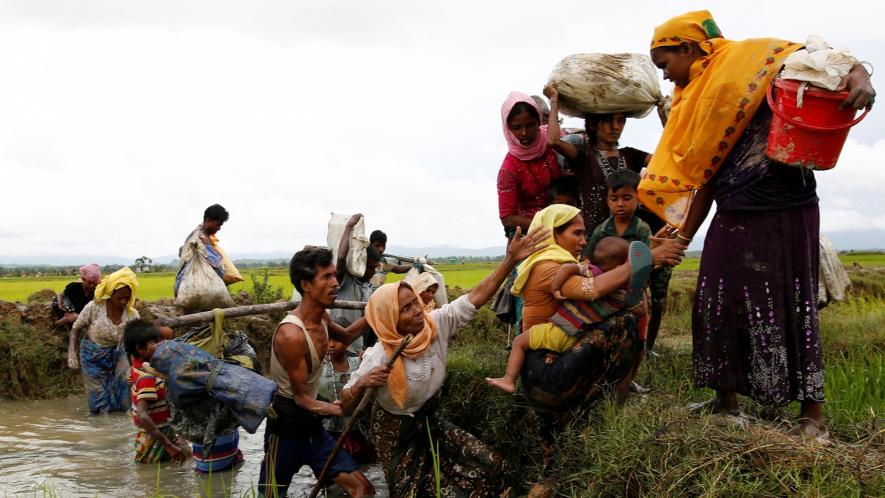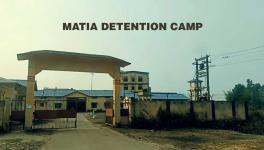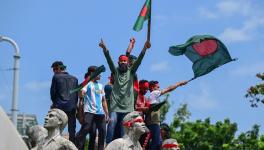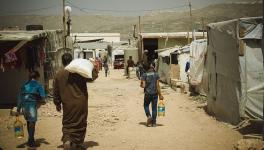BSF Plans Five Battalions—6,000 Soldiers—on Bangladesh Border to ‘Push Back’ Rohingya Refugees

The Border Security Force (BSF)—India’s primary border guarding force—plans to raise five battalions (6000 soldiers) to keep vigil on the India-Bangladesh border to stop the influx of Rohingya refugees — considered the “world’s most persecuted minority group” by the United Nations.
Nearly 1 million Rohingya Muslims have fled ethnic violence in Myanmar over the years, especially since August 25 this year when the Myanmar military launched operations against them, and have found refuge in neighbouring Bangladesh.
Around 40,000 Rohingyas have crossed over into India and are staying in different parts of the country, as per official estimates.
BSF Director General KK Sharma on November 29 told media persons that the force had asked the Home Ministry to raise five more battalions in order to guard the vulnerable points of infiltration along the Bangladesh border.
However, the BSF has instructions to only “push back” the refugees into Bangladesh, and not to arrest them, because once they are arrested, they become a “liability”, said Sharma.
He said the paramilitary force had apprehended 87 Rohingyas, from the beginning of this year till 31 October, who had crossed the border into India. Of them, 76 had been “sent back to Bangladesh.”
“The Rohingya issue is a complicated one. Our policy is to push them back and not arrest them,” said Sharma, addressing a press conference in Delhi.
“If we arrest anyone trying to infiltrate into India, then they become a liability and then there has to be a process of identifying them. So, we just push them back.”
However—weeks after the BJP-led NDA government told the Supreme Court that the Rohingyas were a “threat to national security”—Sharma said the BSF had not found any case of the Rohingyas being linked to terror outfits or activities, nor had they found any arms or ammunition on those apprehended.
India’s decision to deport the Rohingya refugees had earlier drawn criticism from the United Nations Human Rights Council (UNHCR).
“In our assessment, no link of Rohingya refugees with terror activities or groups has emerged… We have not found any arms or ammunition on Rohingya (refugees) apprehended by us,” Sharma said.
But he added that such links could not be ruled out, since these inputs were given by intelligence agencies, who’ve claimed that Rohingyas have connections with terror groups like the Islamic State and the Lashkar-e-Taiba.
Sharma said the BSF’s mandate was “very clear”: to “not allow any illegal immigration into India.”
“As per the latest estimate, 9-10 lakh of them have migrated to Bangladesh (from Myanmar) and the possibility of a spill-over coming to India cannot be ruled out.”
Sharma also pointed out that the BSF guards were not equipped to distinguish between Rohingyas and Bangladeshis on the basis of dialect or facial features, which were similar.
In an official press note, the BSF said the unavailability of basic amenities in the Bangladeshi refugee camps had led to many Rohingyas attempting to enter India.
“The interrogation of apprehended Rohingyas has revealed that they have been staying in refugee camp at Cox's Bazaar in Bangladesh where there are no basic amenities available so they do not want to settle there,” said the BSF statement.
“Agents allure these Rohingyas with good job opportunities in India and tell them that they will work with their own Muslim community in some of the states such as Jammu and Kashmir, Tamil Nadu and West Bengal.”
The Rohingyas have endured several cycles of military violence, beginning in 1978, and they are effectively stateless as they are denied citizenship under the 1982 Myanmar nationality law.
The community has been under military siege in the country’s northern Rakhine state since October 2016, but the persecution intensified since August 25 this year, when the Myanmar Army launched a crackdown against Rohingyas. Myanmar claims the military operations were in response to attacks by Rohingya rebels.
According to the UN Inter-Sector Coordination Group, more than 605,000 Rohingyas have arrived in Bangladesh after fleeing violence in northern Rakhine State since August 25.
Get the latest reports & analysis with people's perspective on Protests, movements & deep analytical videos, discussions of the current affairs in your Telegram app. Subscribe to NewsClick's Telegram channel & get Real-Time updates on stories, as they get published on our website.
























